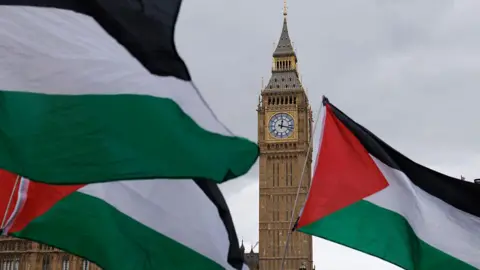### The Implications of Sir Keir Starmer’s Pledge on Palestinian Statehood
In a recent address delivered from the iconic Number 10 Downing Street, Sir Keir Starmer, the UK Prime Minister and leader of the Labour Party, presented a significant political maneuver regarding the understanding of Palestinian statehood. Meanwhile, outside the historic government building, a cacophony of protests from Gaza supporters filled the air with drums, sirens, and whistles, signaling palpable public dissent regarding the UK’s stance on Israel. This protest represented not only a demand for change in foreign policy but also highlighted the political pressure that Starmer is navigating as he seeks to broaden Labour’s narrative on international conflicts.
Starmer’s speech and the subsequent protests underscore an increasing urgency among both public and political figures in Britain. The pressure on Starmer is characterized by an urgent call from more than half of Labour’s backbench MPs demanding that the UK government formally recognize the state of Palestine. Additionally, several members within the cabinet have participated in lobbying efforts behind the scenes, indicating a wider networks of political maneuvering at play.
### Shifts in British Foreign Policy
As Sir Keir addresses the nation, the government appears to be firming up its language and stance concerning Israel and Palestine. The implications of this are monumental, marking what could represent a pivotal shift in British foreign policy. It has historically been within Labour’s strategy to recognize Palestine as part of a broader peace negotiation framework, and now, with current humanitarian crises reaching critical severity, Starmer seems to believe the time for action is ripe.
In an outlined framework, Starmer specified that formal recognition of a Palestinian state could occur as early as September unless the Israeli government takes decisive actions to remedy the dire humanitarian situation in Gaza. Specifically, he laid down several conditions under which recognition could proceed, stipulating that Israel must demonstrate a commitment to a ceasefire and affirm the absence of plans for annexation in the West Bank. Furthermore, the recognition hinges on Israel’s commitment to a two-state solution, underscoring a historical stance that resonates with international norms on conflict resolution.
### Complex Dynamics with Hamas and Israel
The premier’s address did not solely lay accountability at Israel’s feet. Alongside conditions for Israel, demands were placed on Hamas, requiring them to release all hostages, endorse a ceasefire, and agree to disarmament while renouncing governance roles in Gaza. This dual-condition approach raises questions about the feasibility of such agreements given the current political landscape in Israel, which is notably influenced by right-leaning factions opposed to any collaborative peace processes.
Doubt exists regarding Hamas’s willingness to adhere to a disarmament policy and relinquish control, while critics, including Labour MP Sarah Champion, have expressed concern over the conditionality that seems to position Palestinian recognition as dependent upon Israeli behavior. Champion’s assertion that recognition should inherently relate to Palestinian self-determination highlights the complex intersection of rights and political negotiations at play.
### The Future of UK-Palestine Relations
As the dialogue surrounding Palestinian statehood gains momentum in Parliament, the question looms: will the Labour government effectively shape a recognizable stance towards Palestine, or will it fall short and be perceived as a symbolic gesture devoid of substantive outcomes? Opinions remain divided, with some Labour MPs feeling uneasy about framing recognition as contingent upon Israeli actions.
Additionally, the broader question of whether British action can tangibly impact the geopolitical landscape remains contentious. Given the historical context and the US government’s influential role in Israeli-Palestinian relations, Starmer’s intent to assert Britain’s position may be hindered by external political forces. Figures like former US President Donald Trump have even suggested that recognizing Palestine under current circumstances would unfairly benefit Hamas, complicating matters for the UK on the global stage.
### Conclusion: To What End?
Sir Keir Starmer’s challenge looms large: to navigate this delicate situation to avoid reducing a potential policy change to mere symbolism. While his administration aims to leverage conditions to push Israel toward a strategic pivot, the ability to achieve a pragmatic and lasting resolution to the conflict pivots on negotiations and relations that extend well beyond the UK’s borders. Ultimately, the realization of a meaningful impact rests heavily on the decisions made not only in London but also in Jerusalem and Washington, suggesting that the quest for justice and peace in Palestine remains, as always, a complex and multifaceted struggle.











